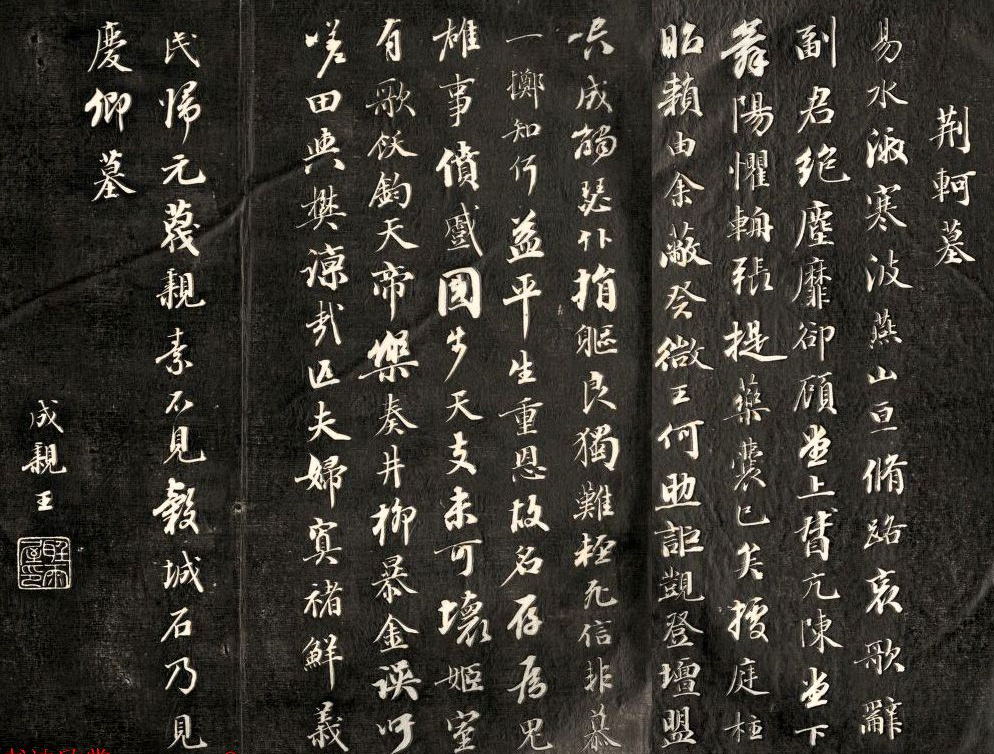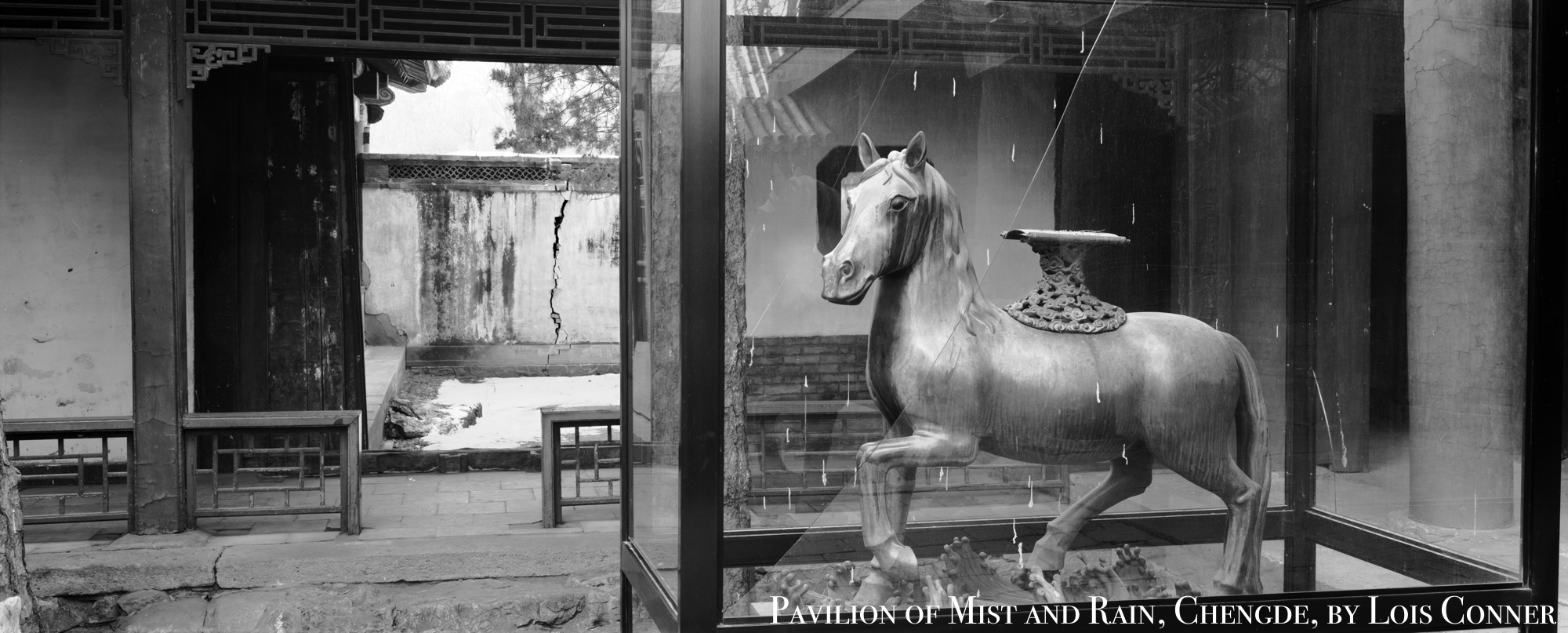無辜籲天,穢德彰聞。
‘Oh! ye multitudes of the west, hearken all to my words.
‘I have heard that the good man, doing good, finds the day insufficient; and that the evil man, doing evil, also finds the day insufficient. Now Shou [Xin 辛, or Zhou 紂], the king of Shang, with strength pursues his lawless way. He has driven away the timeworn sires, and cultivates intimacies with wicked men. Dissolute, intemperate, reckless, oppressive, his ministers have become assimilated to him; and they form combinations and contract animosities, and depend on their power to exterminate one another.
‘The innocent cry to Heaven. The odour of such a state is felt on high.’
嗚呼!西土有眾,咸聽朕言。
我聞吉人為善,惟日不足。凶人為不善,亦惟日不足。今商王受,力行無度,播棄犁老,暱比罪人。淫酗肆虐,臣下化之,朋家作仇,脅權相滅。
無辜籲天,穢德彰聞。
— ‘The Great Declaration, II’
Book of Documents
《尚書 · 泰誓中》
trans. James Legge
***
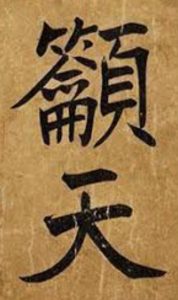
***
‘The Great Declaration’ 泰誓, recorded in the classic Book of Documents 《尚書》, is a call to arms by King Wu of the State of Zhou 周武王 (first millennium BCE). The king lists the crimes of Xin, the ruler of Shang 商辛王, an infamous despot known to history as the Tyrant Zhou 紂. One of Xin’s outrageous acts was to have had the heart of Bigan 比干, a sagely adviser, dug out of his chest on the pretext of wanting to see whether the hearts of wise men really had ‘seven openings’ 七窍. Thereafter, the expression 比干剖心 Bǐgàn pōu xīn — ‘Bigan’s gouged-out heart’ — referred both to loyal advisers and outspoken people punished by a tyrant.
Today, 1 October 2020, readers in different climes may appreciate the despair and outrage expressed by this 籲天 yù tiān, ‘cry to Heaven’ in varying ways. Be they in China, the United States, or at any other locale on this benighted globe, many will readily be able to identify those in government who have ‘driven away the timeworn sires‘ and are cultivating ‘intimacies with wicked men’.
仁者見仁, 智者見智。
— The Editor
***
‘Mouths Sealed Shut’ 封口 fēng kǒu
‘Speech Forbidden’ 禁言 jìn yán
As we noted in an earlier chapter of Viral Alarm: China Heritage Annual 2020:
‘Silent China and its Enemies is a topic to which we return time and again. It concerns the efforts of the Chinese state, its agencies and affiliates, be they in- or outside the People’s Republic to cow and silence outspoken critics, dissidents, professionals in all fields, citizen journalists, writers of conscience, outraged individuals, or indeed a plethora of others who resist the Communist Party’s imposed, and heavily policed, status quo.
‘In discussing this topic, and the problems that China’s rulers create not only for the people over whom they rule, but for themselves as well, Xu Zhangrun 許章潤, an outspoken professor of law, frequently employs the ancient term 鉗口 qián kǒu, also 箝口, to close the mouth tightly, or to have someone silenced. It is a shorthand for 鉗口結舌 (also written 箝口結舌 or 緘口結舌), that is “to seal the mouth and tie the tongue in a knot”. Through the ages, while some wise souls repeatedly cautioned against it, others have been enthusiastic advocates in favour of shutting people up. The medical-political-social crisis of the coronavirus in 2020 has focussed people’s attention on a subject that has obsessed the Communists since they first purged outspoken writers in their own ranks in 1943.’
— from ‘The Heart of The One Grows Ever More Arrogant and Proud’
China Heritage, 10 March 2020
***
Whether it be to express impotent outrage, disgust with the myriad frustrations of everyday bureaucracy, opposition to intellectual repression, or the manifold attempts of the Chinese state to impose on people its all-encompassing modulation of thought, word and deed, a number of readymade expressions, long ago formulated in response to earlier autocratic regimes, readily come to mind. They include:
叫天天不應
叫地地不靈
jiào tiān tiān bù yìng
jiào dì dì bù líng
愴地呼天
chuàng dì hū tiān
哀天叫地
āi tiān jiào dì
All give voice to a fervent wish for a higher judgement. Yet, despite the ‘rage against Heaven’ and ‘calls on the Earth to witness’, in using them the appellant acknowledges a beleaguered reality.
***
The following material is published to mark the founding of what a journalist friend calls ‘The People’s Republic of Petulance’. It also acknowledges the Petulant One who squats atop the government of the United States.
I would like to thank Catherine Churchman, an historian of Southern China, for suggesting that 白族野夫 be translated as ‘Yefu of the Pehr People’. We would note that ‘baif cuf‘ is also the ethnonym used for 白族 bái zú people in southwest China, and that one of the literary names of the writer Zhao Ping 趙平 is 白族野夫 bái zú yěfū, literally ‘Man of the Wilds of the Bai People in Yunnan’. Zhao is also known by the literary name ‘Half Monk’ 半僧.
— Geremie R. Barmé
Editor, China Heritage
1 October 2020
Mid-Autumn Festival
National Day of China’s
People’s Republic
***
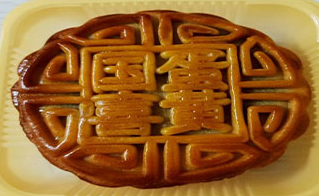
***
A Mid Autumn Festival ‘New Sinology Jotting’:
- ‘The Same Fair Moon 千里共嬋娟’, China Heritage, 4 October 2017
On China’s National Day:
- Geremie R. Barmé, ‘China’s Season of Major Political Anniversaries’, Asia Society, New York, 13 November 2019
- The Editor and Others, ‘Homo Xinensis Militant’, China Heritage, 1 October 2018
- Various hands, ‘1 October 2017 — The Best China’, China Heritage, 1 October 2017
- Sang Ye, ‘The First National Day — two oral history interviews’, trans. Geremie R. Barmé, China Heritage Quarterly, Issue 18 (June 2009)
- Sang Ye 桑曄 and Geremie R. Barmé, ‘Thirteen National Days, a retrospective’, China Heritage Quarterly, Issue 17 (March 2009)
A Lament & a Chimera
The Poetic Sentiments of a Professor Becalmed
The following quatrain, or 絕句 jué jù — a four-lined poem of matched couplets — was composed by Xu Zhangrun 許章潤, the itinerant Master of Erewhon Studio 無齋主. The identity of the calligrapher is unknown.
— G.R.B.
***
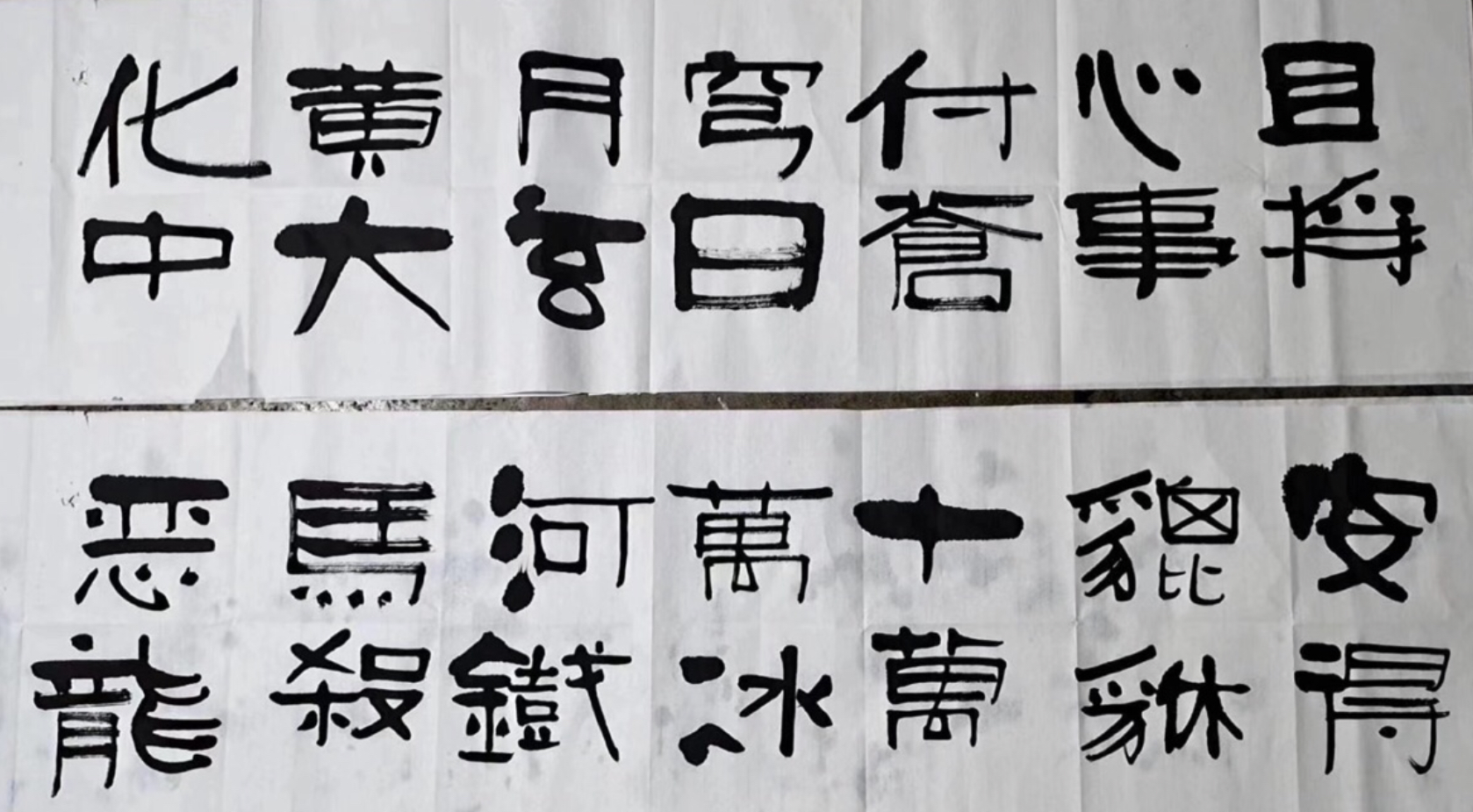
***
Transcribed,
Translated &
Annotated

且將心事付蒼穹
日月玄黃大化中
Let me address then my bleeding heart to Vast Heaven above
As I contemplate the temper of the times and the Eternal Fluctuation
且將心事付蒼穹 qiě jiāng xīn shì fù cángqiōng: is inspired by a line in a well-known poem by Yue Fei (岳飛, 1103-1142), a renowned loyal and militant minister of the Southern Song court. Yue Fei’s original line reads: ‘欲將心事付瑤琴’ — ‘I seek solace for my troubled heart by playing my zither’. He goes on to say that: ‘There are few who will truly appreciate my tune [heart] and, when the strings snap, who will know [or care]?’ Here he is referring to a famous story about the ancient musician Bo Ya (伯牙, 387-299 BCE) and Zhong Ziqi (鐘子期, 413-354 BCE), the only person who could truly ‘understand the music’ 知音 zhī yīn. In full, Yue Fei’s poem reads as follows:
昨夜寒蛩不住鳴。驚回千里夢,已三更。
起來獨自繞階行。人悄悄,簾外月朧明。
白首為功名。舊山松竹老,阻歸程。
欲將心事付瑤琴。知音少,弦斷有誰聽。
日月玄黃 rì yuè xuán huáng: these four characters recall the opening lines of the Thousand-character Classic 千字文, a traditional primer:
天地玄黃,宇宙洪荒。
Darkling sky, earth yellow;
Vast space and time, limitless.
日月盈昃,辰宿列張。
Sun rise and fall, moon waxing and waning;
Stars and heavenly lodges all in their place.
***

安得貔貅十萬萬
冰河鐵馬殺惡龍
Where can be found the multitudes of Devil-beating Creatures
Needed to brave this frozen land and kill that Evil Dragon
貔貅 píxiū: among other things, this mythical creature is said to be able to protect good people during bad times.
冰河鐵馬 bīng hé tiě mǎ: ‘heavily armed cavalry on the frozen wastes’. This is a reference to the last line of a quatrain by the Tang-dynasty writer Lu You (陸游, 1125-1210), ‘夜闌臥聽風吹雨,鐵馬冰河入夢來’. The last two lines of Lu You’s poem, ‘Written on the Fourth Day of the Eleventh Month During a Storm’ 《十一月四日風雨大作》, read:
僵臥孤村不自哀,尚思為國戌輪台。
夜闌臥聽風吹雨,鐵馬冰河入夢來。
Lying ill in this distant village is no time to pity myself
Thinking rather, night and day, how do the borderlands fare?
Late at night, as the rain beats down and the wind howls,
In dreams once more I join forces on the frozen battle field.(See also Nathan Woolley, ‘Lu You Visits Jinling’, Nanking: China Heritage Annual 2017)
惡龍 è lóng: in literature, audio-visual culture and online discussions, the word ‘dragon’ 龍 lóng is often used to refer to the ruler. In this case it indicates Xi Jinping.
***
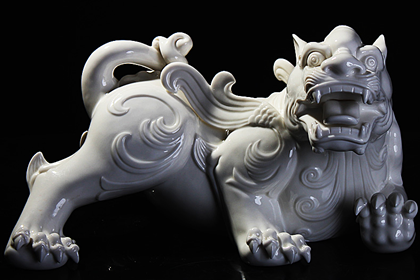
The Assassin Sets Out
Editorial Note:
Jing Ke (荊軻, ?-227 BCE) was a retainer in the court of Dan, crown prince of the State of Yan 燕丹. He failed in a legendary attempt to assassinate King Zheng, the despotic ruler of the expansionist State of Qin 秦王政. The Qin ruler went on to found China’s inaugural dynasty and took the title Qin Shihuang 秦始皇, First Emperor of Qin. Despite millennia of obloquy, in the modern era the infamously cruel emperor found favour both with Mao Zedong and his ‘spiritual heir’, Xi Jinping. The poem by Yefu of the Pehr People below recalls Jing Ke’s tragic daring.
***
The crown prince and all his associates who knew what was happening put on white robes and caps of mourning to see the party off, accompanying them as far as the Yi River. After they had sacrificed to the god of the road and chosen their route, Gao Jianli struck up his lute and Jing Ke joined in with a song in mournful mode. Tears streamed from the eyes of the company. Jing Ke came forward and sang this song:
‘Winds moan and the waters of the Yi are cold,
‘The brave man, once departed, will never return.’
Shifting to a more martial tone, Jing Ke sang once more; this time the eyes of the men flashed with anger and their hair bristled beneath their caps. Jing Ke mounted his carriage and set off, never once looking back.
太子及賓客知其事者,皆白衣冠以送之。至易水上,既祖,取道。高漸離擊築,荊軻和而歌,為變徵之聲,士皆垂淚涕泣。又前而為歌曰:
風蕭蕭兮易水寒,
壯士一去兮不復還。復為慷慨羽聲,士皆瞋目,發盡上指冠。於是荊軻遂就車而去,終已不顧。
— from Sima Qian, ‘The Biography of Jing Ke’
Records of the Grand Historian, Book 86
司馬遷著,《史記·刺客列傳·荊軻》, 卷八十六
trans. Burton Watson, with modification
***
Recalling Jing Ke
憶荊軻
Yefu of the Pehr People
(Man of the Wilds)
白族野夫
My King,
Loan me a head
For when we meet
If that’s not enough
And your generosity allows
Then bestow upon me
Grasslands in which the cinquefoil flourish
A border town with herds of cows and sheep
I have my own knife and I’ve kept it sharp these ten long years
I am more than prepared to rid us of the cruel and violent dragon
Then it may no longer despoil my ancestral land
And, I’ll assuage the fears I hold for my descendants
I am ready to cross the Yi River:
Hear the winds howling
The beat of battle song
— Dali, Yunnan province
19 September 2020
trans. G.R.B.
憶荊軻
白族野夫
借我一顆人頭吧
我的王
作為見面禮
如果還不夠份量
你要慷慨大方
再給我一片
開滿格桑花的草原
一座擁有成群牛羊的邊城
我自備的利刃已磨了十載
我心甘情願去除掉那兇暴的惡龍
以免我先祖的土地被塗炭
以慰我一腔為子孫後代而圖謀的憂患之心
此刻就要渡過易水
風蕭蕭兮
擊築而歌
……2020/9/19大理
***
